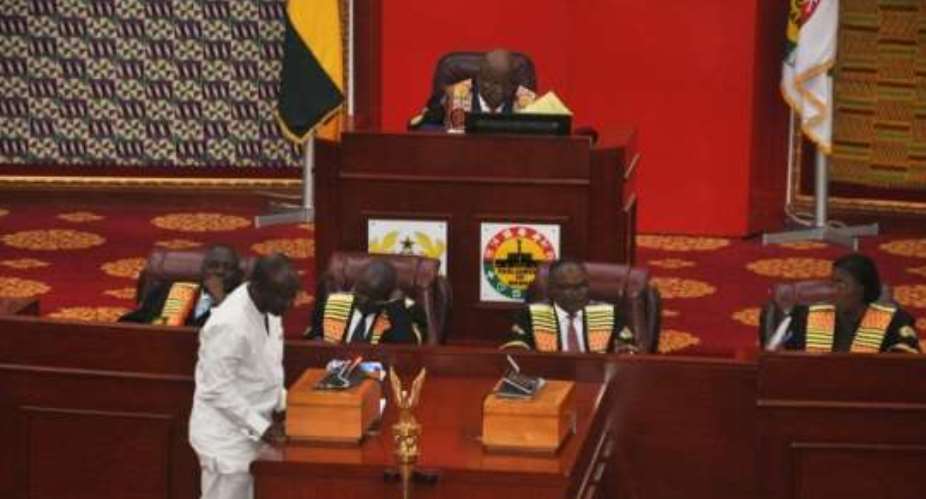Accra, July 31, GNA - The Government has successfully laid the foundation for flagship programmes and would start implementing them in the second half of the year (2017).
Finance Minister Ken Ofori-Atta said the focus of the Government in the first half of the year was to stabilise the economy and to re-establish the principles of good economic governance.
In a Mid-Year Fiscal Policy Review of the 2017 Budget, the first under the Public Financial Management Act, 2016 (Act 921), presented to Parliament on Monday, Mr Ofori-Atta said measures to strengthen revenue performance to enable the Government achieve its objectives were being put in place.
The Minister, on March 2, 2017, presented the first budget, christened; 'Asempa Budget (Good News Budget), to 'brought hope back to Ghanaians and sowed the seeds for growth, prosperity and jobs,' but which the Minority described as Asam Bone (Bad News) budget.
Mr Ofori-Atta commended the Government for 'the prudent economic policies,' saying it has improved fiscal discipline and competent management of the economy, with the macro-indicators for the first half of the year pointing in the right direction.
The flagship programme 'Planting for Food and Jobs', has already taken off, with about 185,907 farmers, out of 200,000 targeted for the 2017 cropping season having been registered and provided with seeds, fertilisers and extension services to improve their yields.
Other flagship programmes include the; 'One District, One Factory' and the restructuring of the National Health Insurance Scheme.
Mr Ofori-Atta said for the first six months of the Akufo-Addo Government, both the fiscal deficit and primary balance outperformed their targets.
'The exchange rate is stabilising, inflationary pressures have eased and interest rates are trending downwards. Progressively, confidence is being restored in the economy and we are confident that this positive trend will be sustained in the months and years ahead,' he said.
During the period, the House passed the Income Tax (Amendment) Act, 2017 (Act 941); the Customs and Excise (Petroleum Taxes and Petroleum Related Levies) Repeal Act, 2017 (Act 943); the Special Import Levy (Amendment) Act, 2017 (Act 944); the Energy Sector Levies (Amendment) Act, 2017 (Act 946); Value Added Tax (Amendment) Act, 2017 (Act 948), and the Earmarked Funds Capping and Realignment Act, 2017 (Act 947).
The Special Petroleum Tax (Amendment) Act, 2017 (Act 942) and Customs (Amendment) Act, 2017 (Act 949) were also passed.
The Government also abolished the one per cent Special Import Levy which was imposed mainly on imported raw materials and machinery; the 17.5 per cent VAT/NHIL on financial services; the 17.5 per cent VAT/NHIL imposed on airline tickets; the excise duty on petroleum to reduce the excess burden on final consumers and reduced the special petroleum tax rate from 17.5 per cent to 15 per cent to mitigate the excess burden on final consumers.
It has abolished also five per cent VAT flat rate on the sale of real estate; the import duty on spare parts; exempted from tax, the gains from realisation of securities listed on the Ghana Stock Exchange.
The Government has also reviewed the ESLA to reduce the cost of power and reduced the National Electrification Scheme Levy from five per cent to three per cent; and the Public Lighting Levy from five per cent to two per cent.
The Finance Minister announced that he would come back to Parliament this week to lay the Regulations to abolish the 17.5 per cent VAT/NHIL on selected imported medicines, which are currently not produced locally.
The Mid-Year Fiscal Policy Review focused on an overview of recent macroeconomic developments; an update of macroeconomic forecasts contained in the 2017 Budget; analysis of the total revenue, expenditure and financing performance; a revised 2017 macro-fiscal framework and the implication of the revised budget outlook for the Medium-Term Fiscal and Expenditure Framework.
According to the Minister, the New Patriotic Party inherited a 'severely impaired economy, but provisional data released by the Ghana Statistical Service in April, 2017, however, show that real GDP growth for 2016 was 3.5 per cent, against the provisional estimate of 3.6 per cent reported in the 2017 Budget and lower than the 3.8 per cent recorded for 2015, the lowest in over 15 years.
The Services Sector, which though was the best growth performer in 2016, recorded a growth of barely 5.7 per cent, followed by the Agriculture Sector, growing at 3.0 per cent and the Industry Sector which contracted by 1.4 per cent.
GNA
By Benjamin Mensah, GNA





 'Kill whoever will rig Ejisu by-election' – Independent Candidate supporters inv...
'Kill whoever will rig Ejisu by-election' – Independent Candidate supporters inv...
 Ashanti Region: ‘Apologize to me for claiming I owe electricity bills else... – ...
Ashanti Region: ‘Apologize to me for claiming I owe electricity bills else... – ...
 Ghana is a mess; citizens will stand for their party even if they’re dying — Kof...
Ghana is a mess; citizens will stand for their party even if they’re dying — Kof...
 Internet shutdown an abuse of human rights — CSOs to gov't
Internet shutdown an abuse of human rights — CSOs to gov't
 Free SHS policy: Eating Tom Brown in the morning, afternoon, evening will be a t...
Free SHS policy: Eating Tom Brown in the morning, afternoon, evening will be a t...
 Dumsor: A British energy expert 'lied' Ghanaians, causing us to abandon energy p...
Dumsor: A British energy expert 'lied' Ghanaians, causing us to abandon energy p...
 What a speech! — Imani Africa boss reacts to Prof. Opoku Agyemang’s presentation
What a speech! — Imani Africa boss reacts to Prof. Opoku Agyemang’s presentation
 Dumsor: Tell us the truth — Atik Mohammed to ECG
Dumsor: Tell us the truth — Atik Mohammed to ECG
 Dumsor: Don't rush to demand timetable; the problem may be temporary — Atik Moha...
Dumsor: Don't rush to demand timetable; the problem may be temporary — Atik Moha...
 Space X Starlink’s satellite broadband approved in Ghana — NCA
Space X Starlink’s satellite broadband approved in Ghana — NCA
